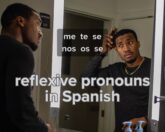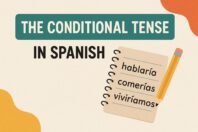Shortcut To Spanish Subjunctive: 50 Scenarios To Know

Get our free email course, Shortcut to Conversational.
Have conversations faster, understand people when they speak fast, and other tested tips to learn faster.
More infoThe Spanish subjunctive is something that beginner students often avoid for as long as possible. The truth is that even if you never studied the subjunctive, you’re likely to hear it on a regular basis when speaking with native speakers.
A shortcut for using the subjunctive, without actually learning the subjunctive, is by memorizing expressions or scenarios where the subjunctive is commonly used.
Before continuing, let’s clarify two points:
- The subjunctive is a mood, not a tense
- The subjunctive is typically used to express desire, emotions, doubts, and things that are not yet a fact
Based on point 2, some expressions, particularly those that express good wishes or worry, naturally require the subjunctive.
In this post, we are going to list 50 different examples of the subjunctive being used so that even if you never studied the subjunctive, you can memorize some common (and not-so-common) scenarios and expressions in order to apply this mood right away.
We’re going to start with basic expressions you will hear from Spanish-speaking friends on a day-to-day basis.
Spanish Subjunctive: Basic Conversation
By far the most common use of the subjunctive – which can be used with anyone.
1. To go / Ir
I hope you do well – ¡Que te vaya bien!
2. To Enjoy / Disfrutar
Enjoy yourself – ¡Que disfrutes!
3. To have / Tener
Have a nice meal! – ¡Que tengas/tengan buen provecho!
4. To sleep / Dormir
Sleep tight! – ¡Que duermas bien!
5. To see / Ver
Hope to see you soon! – Espero que nos veamos pronto
6. To rest / Descansar
Bye, rest well! – ¡Chao, Que descanses!
7. To get better / Mejorar
Get better soon! – ¡Que te mejores pronto!
8. To have / Tener
Have a nice trip! – ¡Que tengas buen viaje!
9. To rain / Llover
I hope it doesn’t rain tomorrow! – ¡Ojalá no llueva mañana!
10. To be / Ser
I want it to be Friday!- ¡Quiero que sea viernes!
11. To be / Ser
I hope you´ll be happy – Espero que sean felices
12. To have fun / Divertirse
Have fun! – ¡Que te diviertas! (Singular) / ¡Que se diviertan! (Plural)
13. To arrive / Llegar
We´ll talk when you get home – Cuando llegues a casa hablamos
14. To go / Ir
I don’t think he is going to the party – No creo que vaya a la fiesta
15. To come / Venir
I don’t think they´re coming – No creo que vengan
16. To call / Llamar
They probably call us – Probablemente nos llamen
17. To cancel / Cancelar
Your subscription will end once you cancel it – Su suscripción terminará una vez que la cancelen
18. To remember / Recordar
As far as I remember, I don’t think I’ve seen them – Que yo recuerde, no creo haberlos visto.
19. To bless / Bendecir
God Bless you – ¡Dios te bendiga!
20. To Cost / Costar
At any cost, I will buy that – Cueste lo que cueste, compraré eso
21. To be / Ser
May it be for the good of all – Que sea para el bien de todos
Spanish Subjunctive: Things Your Mother Might Say
Now we’re getting a little more specific.
These expressions are normally tied to a warning, perhaps from a parent or someone of authority.
22. To accept / Aceptar
Do not accept anything from a strange person. – No aceptes nada de una persona extraña
23. To fall / Caerse
Stay Calm! when you fall off the chair, I don’t wanna hear you cry! – ¡Quedate tranquilo! ¡Cuando te caigas de la silla, no quiero oírte llorar!
24. To have / Tener
When you have children, you will remember my words – Cuando tengas hijos, te acordarás de mis palabras
25. To break / Romper
When you break the toy, you’ll stay calm – Cuando rompas el juguete, te quedarás tranquilo
26. To be / Ser
This is the last time you leave without permission! – ¡Que sea la última vez que sales sin permiso!
27. To have and to bring / Haber y Traer
If you had brought the jacket, as I told you, you wouldn’t be cold – Si ustedes hubieran traído la chaqueta como les dije, no tendrían frío
28. To be / Ser
Whoever it is, do not open the door. – Sea quien sea, no abras la puerta.
29. To do / Hacer
Whatever you do, do it with love – Hagas lo que hagas, siempre hazlo con amor
30. To go / Ir
Wherever you go, you must call me to know where you are. – Vayas donde vayas, debes llamarme para saber dónde estás
31. To live / Vivir
When you live in your own house, you can do whatever you want – Cuando vivas en tu propia casa, podrás hacer lo que quieras
32. To have and To lend / Haber y prestar
If you had paid attention to me, none of this would be happening. – Si me hubieras prestado atención, nada de esto estaría pasando
33. To help / Ayudar
I wouldn’t mind if you helped me clean up. – No me molestaría, si me ayudaras a limpiar
34. To want / Querer
Tell me when you want to go – Dime cuando te quieras ir
Spanish Subjunctive: Asking Questions?
Essential to having a two-way conversation.
35. To help / Ayudar
Do you want me to help you? – ¿Quieres que te ayude?
36. To adopt / Adoptar
Do you want me to adopt these dogs? – ¿Quieres que adopte a estos perros?
37. To be able / Poder
Do you think you can turn down the volume of the radio? – ¿Crees que puedas bajar el volumen de la radio?
38. To dance / Bailar
Would you like to dance tonight? – ¿Quieres que bailemos esta noche?
39. To give / Dar
Do you want to take a walk? – ¿Quieres que demos un paseo?
40. To win / Ganar
Who do you want to win the contest? – ¿Quién quieres que gane el concurso?
41. To go / Ir
Where should we go? – ¿A donde quieres que vayamos?
42. To place/put / Poner
Where do you want me to put the grocery bags? – ¿Dónde quieres que ponga las bolsas de mercado?
43. To work / Trabajar
Do you want me to work on weekend? – ¿Quieres que trabaje el fin de semana?
44. To do / Hacer
Do you want me to make dinner? – ¿Quieres que haga la cena?
45. To see / Ver
Would you like to meet tonight? – ¿Quieres que nos veamos esta noche?
46. To happen / Suceder
Do you think something is going to happen tonight? – ¿Crees que esta noche suceda algo?
47. To live / Vivir
Do you want us to live together? – ¿Quieres que vivamos juntos?
48. To have / Tener
Is there any place that has wifi? – ¿Hay algún lugar que tenga wifi?
49. To have / Haber
Do you think there is a vegan restaurant in the city? – ¿Crees que en la ciudad haya un restaurante vegano?
50. To graduate / Graduarse
What will you do when you graduate? – ¿Qué harás cuando te gradues?
__________________________________
Now you know how to use the Spanish subjunctive, without actually learning the Spanish subjunctive.
However, since we have you here, below is a list of some in-depth posts which will help you master each subjunctive form:



